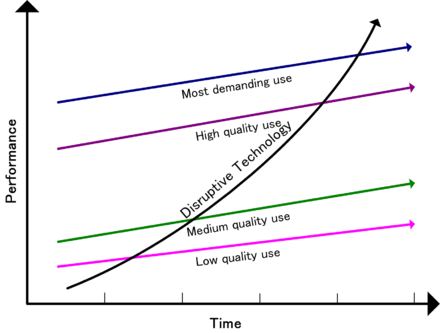The (Latent) Benefits of Disruptive Technology
How innovative tech can change industries.
Recently, I have been fascinated with the idea of disruptive technology and a term I am deeming “latent appreciation” for lack of better diction. As with most things, I was inspired to write this article after observing a pattern in pop culture. Whether it was an unconventional album, clothing line, or movie, I began to notice contrasts between initial appreciation of the product (low) versus the product’s impact several weeks to months post-release. In almost all cases, consumers first rejected the media as too far from industry norms. Weeks later, however, the same media were praised as “revolutionary” or “raising the bar” for their respective fields. Why, then, did people hate it at first?
A few clicks on the internet led me to a business term called disruptive innovation. Wikipedia uses the term to describe any “innovation that creates a new market and value network and eventually disrupts an existing market and value network, displacing established market-leading firms, products, and alliances.” In short: anything that changes an industry. Almost. Because as I found out, there exists a key difference between revolutionary technology and disruptive tech.
In the simplest way that I can describe it, disruptive technology creates a good that no one knew they needed, but now everyone has to have. Exhibit A: Smartphones. Thousands of years of human development passed without “hey siri” and LED screens, but once smartphones came on the market, the world changed forever. Granted, not every disruptive innovation leads to such an impactful outcome. Take the steamboat, for example. At the time of its inception, steamboats proved efficient and powerful in comparison to sailboats. Now, however, gasoline and diesel powered engines have all but reduced steam engines to novelty items.
Along with the introduction of disruptive technology, there generally appears backlash from the public. It takes anywhere from a few weeks to a few months for consumers to appreciate the genius. As a result, early adopters of the technology take an initial risk but benefit in the long run within their industry.
Each industry can be traced to a few key innovations that have disrupted their markets in powerful ways. For the communication industry, it was the introduction of the telephone. For Data, the CD and USB. For manufacturing, plastic. We use these items so often that we rarely stop to appreciate their significance in our lives. They are so integral to modern society that we pass them off as inventions that must have in some way always existed. Only one question remains: what’s next?














